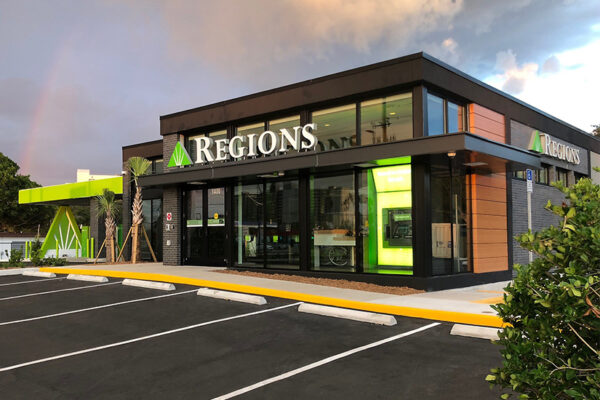|
Getting your Trinity Audio player ready...
|
Regions Bank currently spans 16 states across the South, Midwest, and Texas with 1,800 banking offices and over 2,200 ATMs. For over 18 years, Director of Retail Construction John Earley has been part of the Birmingham, Alabama-based bank’s growth and has helped Regions move into new areas, expand its reach in others, and update the bank’s capabilities. To paraphrase Regions CEO John Turner, Earley says, it boils down to a very simple motive: “We just want to continue to find ways to make banking easier for our customers. That may be a tagline for the bank, but that’s exactly how I look at my job, with the customer in mind.”
Earley’s partners can attest to the construction director’s abilities to make this possible by maintaining strong relationships with them as well. “Working with John Early over the past four years has been an incredible experience. He values the relationship between owner and contractor,” says Torrey Hawkins, president of Angler Construction, who collaborated with Regions to remodel its offices and warehouse spaces.

“He trusts in Angler Construction perform and we go above and beyond to make that happen,” Hawkins says. “Our history of 25-plus branches together shows this model works. John knows that challenges arise in construction, but he always stays focused on how the team overcomes these hurdles.”
Universal Ease
Earley’s current efforts are a reflection of extensive surveys and studies to help find ways to enable that ease, both for Regions’ customers and its employees. In some ways it’s a refresh for the growing brand. Earley says while the marketing brand for the bank has always been strong, that relationship has become much more interlocked as Regions continues to find ways to unify its growing presence.
“What my team does is a vital piece of not just our brand but how it’s evolved I over the years,” Earley says. “We’ve focused on design development and where this bank is going, what our peers are doing, and how we can surpass those expectations.”
One of the ways his team helps accomplish the goal of making banking easier is through Regions’ “universal banker” concept. Unlike the traditional banking model which employs tellers, platform associates, and other specialty roles, the universal banker concept seeks to make the associate an all-in-one customer enabler, able to switch roles and provide customers what they need, when they need it.
“To make the universal banker concept work we had to integrate new technology, including teller cash recyclers (TCRs), and video technology that makes work for associates cleaner, faster, and more efficient,” Earley explains.
For example, from a practical standpoint, using TCRs in a branch is an efficient way to deliver traditional teller functions. It allows banking associates, located in “pods,” to move more flexibly in helping customers and reduce customer wait time.
The same goes for interiors at overhauled and newly built Regions locations. Traditional bank space at a Regions location occupied around 6,000 square feet. Earley says that was a great way to run a bank in previous decades, but not now.
“In some cases, we’re in the process of finding the right locations that will fit our smaller space needs,” the director says. “In others, we’re reducing the amount of space we occupy. It trims down the operational expenses in these buildings and just makes sense for the way we want to do business going forward.”

A Business in a Business
During Earley’s tenure, he’s seen the bank move into Florida, expand in cities like Atlanta and St. Louis, and build a presence in the Carolinas. But the mindset has evolved along the way. Instead of moving ahead with 20 new branches in a city, the Regions team is now utilizing a more site-specific, top-of-market strategy. It’s a wise move for a bank that has grown quickly but is now taking the time to rightsize and optimize its current locations, aligning its brand, and growing together.
As Regions expands its borders, so has Earley. Over 18 years, Earley rose from an early project manager role up through the ranks. “As you move up, you place more importance on trying to grow the people under you from a project management perspective,” Earley says. “The role becomes a lot more about communication, reporting, and doing more strategy-based thinking about where you want to carry your group as a whole.”
The director says his role almost feels like running his own business within the structure of the broader organization. “I treat it like my own company,” Earley says. “I want the best profits, the best cost savings, and the best ideas to make what we do more efficient and profitable.”
When asked to give advice, Earley has to pause. He’s too humble to start rambling off platitudes, and he gives the impression of a leader who is right there beside his people, not issuing down edicts from on high. “Just try and learn from those who have been ahead of you,” the director says. “There’s so much you can take and use to develop your own decision-making process. Just try and give back as you grow.”
For Earley, 18 years seems to have flown by, and there’s a good reason for it. “I think it’s really important that you have to love what you do,” Earley explains. “I’m blessed to have found something I’m good at and love doing, and I think that’s a great way to ensure you’re going to be successful.”


